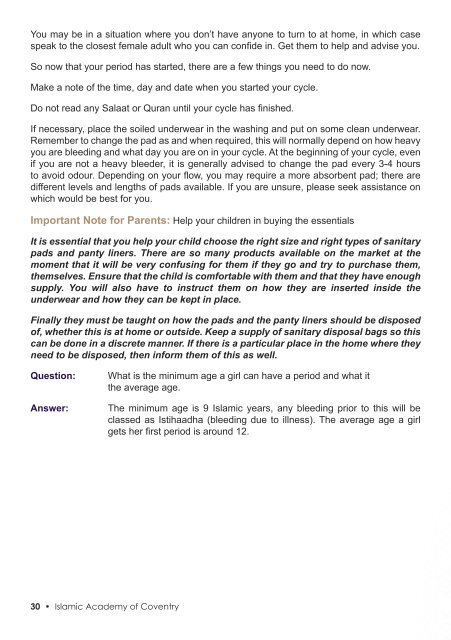Create successful ePaper yourself
Turn your PDF publications into a flip-book with our unique Google optimized e-Paper software.
You may be in a situation where you don’t have anyone to turn to at home, in which case<br />
speak to the closest female adult who you can confide in. Get them to help and advise you.<br />
So now that your period has started, there are a few things you need to do now.<br />
Make a note of the time, day and date when you started your cycle.<br />
Do not read any Salaat or Quran until your cycle has finished.<br />
If necessary, place the soiled underwear in the washing and put on some clean underwear.<br />
Remember to change the pad as and when required, this will normally depend on how heavy<br />
you are bleeding and what day you are on in your cycle. At the beginning of your cycle, even<br />
if you are not a heavy bleeder, it is generally advised to change the pad every 3-4 hours<br />
to avoid odour. Depending on your flow, you may require a more absorbent pad; there are<br />
different levels and lengths of pads available. If you are unsure, please seek assistance on<br />
which would be best for you.<br />
Important Note for Parents: Help your children in buying the essentials<br />
It is essential that you help your child choose the right size and right types of sanitary<br />
pads and panty liners. There are so many products available on the market at the<br />
moment that it will be very confusing for them if they go and try to purchase them,<br />
themselves. Ensure that the child is comfortable with them and that they have enough<br />
supply. You will also have to instruct them on how they are inserted inside the<br />
underwear and how they can be kept in place.<br />
Finally they must be taught on how the pads and the panty liners should be disposed<br />
of, whether this is at home or outside. Keep a supply of sanitary disposal bags so this<br />
can be done in a discrete manner. If there is a particular place in the home where they<br />
need to be disposed, then inform them of this as well.<br />
Period Pains<br />
You will also most probably experience some period pains. The medical term for period pains<br />
is dysmenorrhoea. The NHS web site has a description for this as follows:<br />
“The pain is usually felt as painful muscle cramps in the lower tummy, which can sometimes<br />
spread to the back and the thighs. Sometimes the pain comes in intense spasms, while at<br />
other times the pain may be dull but more constant. The pain normally starts with your period<br />
and last for between 48 and 72 hours”<br />
If the pain is severe then it is recommended that you visit your chemist and speak to the<br />
pharmacist. Inform them of the symptoms and they will be able to advise you on what pain<br />
relief you can take. Take your parent or older sister with you because sometimes, certain<br />
medication can only be purchased by adults. Ensure that you take the correct dosage.<br />
If the pain relief is not affective then book an appointment with your GP and they can<br />
prescribe the relevant medication to help with the pain. In any case, there is no need to<br />
suffer in silence, speak to someone and tell them.<br />
The bleeding may be heavy in the beginning and get lighter as the period is about to finish.<br />
This may be just some light spotting. Once the bleeding completely stops, make a note of<br />
the time and day, calculate how many days your cycle lasted.<br />
Perform Ghusl and start reading your Salaat again.<br />
To be sure that you are ritually clean (Taahir) you can check the colour of your discharge<br />
when it is wet as the colour can change when it dries. If the colour of the discharge is white<br />
or clear when it is wet then you are ritually clean (Taahir).<br />
Note: If you are ritually pure at the end time of any Salaat, it must be read.<br />
Question:<br />
Answer:<br />
What is the minimum age a girl can have a period and what it<br />
the average age.<br />
The minimum age is 9 Islamic years, any bleeding prior to this will be<br />
classed as Istihaadha (bleeding due to illness). The average age a girl<br />
gets her first period is around 12.<br />
Remember that the Salaat, in which you became clean in, is now obligatory so perform<br />
Ghusl as soon as you can and ensure you read your Salaat.<br />
30 • Islamic Academy of Coventry <strong>Female</strong> <strong>Hygiene</strong> • 31


